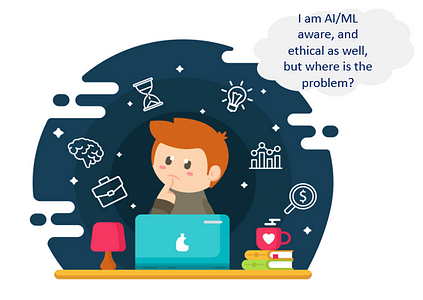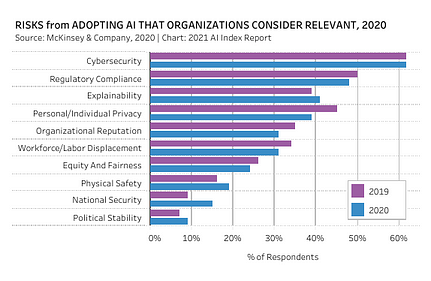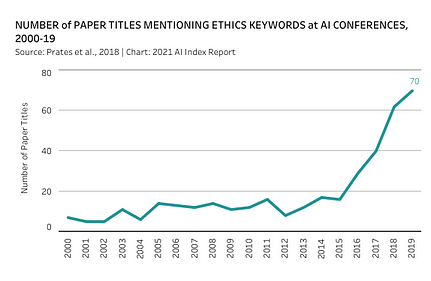
Photo by Greg Rakozy on Unsplash
Responsible AI, Ethical AI, AI for social good — I am sure you must have heard these terms at some point or the other, whether you are a Data Scientist or not.
When I first heard these terms, the warning from Prof Stephen Hawking rang in my ears:
“The development of full artificial intelligence could spell the end of the human race.”
And there my journey of understanding this critical aspect of the AI foundation started. I used to wonder how to relate ethics with AI which is just a series of algorithms, when, in fact, we have not been able to apply ethical behavior among ourselves.

Source: Business vector created by freepik
As per the AI index report published by the Stanford University Institute for Human-Centered AI, cybersecurity and regulatory compliance are among the top risks identified by AI/ML-oriented organizations.

Source: https://aiindex.stanford.edu/report/
Another report reveals how AI has captured interest among undergraduate students.

Source: https://aiindex.stanford.edu/report/
Now, let us come to the topic of our discussion today, ethics in AI. The sheer exponential increase in the number of papers presented in the conferences talking about ethics over the last five years, speaks volumes about its importance.

Source: https://aiindex.stanford.edu/report/
The Omnipresent AI
The applications of AI reside in almost every walk of our life. A look at our phone and the magic starts to happen right away in the form of facial recognition, as we unlock our phone. We see a lot of recommendations fed to us, right from the newsfeed, videos, music, the products we buy at e-commerce websites to the auto-completion suggestions of the words we type while chatting on messengers or writing that email draft.
You do not want to type any query — don’t worry. There are multiple digital voice assistants, Siri, Alexa, Ok Google at your service.
These are just some of the examples of how we are surrounded by AI everywhere.
It might appear that AI has made our lives easier. It has indeed. But like two sides of the coin, the opinion about how AI is traversing its way into our lives needs an unbiased look from ‘the other side’.
Let’s watch this video and we will talk further on how the other side looks like:
Source: youtube
Ignore the brand behind the video and share how do you feel if you were Felix. Do you feel comfortable being tracked right at the moment you make a coffee transaction from the time you board the cab to the use of GPS which tells the organization recording your data about where you go, what routine you follow? Does it end here? NO.
It goes on to knowing whom you meet, what you talk about, where is your next possible destination, which brand’s gadget you should buy, what beliefs you carry, what is your family composition, your ethnicity, culture, and a lot of other things that would make you uncomfortable as Felix became at the end of the video.
It gets ignored when we think of the apps asking us to “allow access” as a virtual nobody, but the video shows the people (read the “for-profit” companies) surveilling you to give a physical meaning and existence, which is daunting.
Who is at fault — the technology or the businesses?
Some think that over criticizing the businesses using AI for making profits is not “ethical” either. The point is not to criticize anyone, in particular, AI, after all, businesses are meant to make profits which boosts up the economy.
But the question arises that are we equally concerned about our existence? The glaring issues of air pollution, water contamination, industrial gas emission, moribund marine life, civil rights need equal attention, if not more.
Only focus on running businesses might make someone achieve the targets faster, but it will not take anyone farther. Ultimately, we all together make one world which needs all of us to survive in a sustainable environment and care for our planet Earth.
I won't discuss the principles and pillars of what constitutes an Ethical AI. I will leave it to the experts. In particular, the links below helped me a lot to develop an understanding and ethical purview of the AI ecosystem.
- 9 ethical AI principles for organizations to follow
- Experts Doubt Ethical AI Design Will Be Broadly Adopted as the Norm Within the Next Decade
It hurts to see that it is still a long way to see the organizations wear the ethical lens and take significant actions in this direction.
One of the reasons for such slack also stems from the fact that we are new to this ethical framework where a lot is unknown to us. We have to ask questions fast and continue updating our book of Ethics, which in itself is a tougher road to travel.
We do not know what is ethical, consider the following questions:
- Who would you save between an adult or a kid?
- Whose life is more important — a business tycoon or a daily wager? Notice the definition of importance in itself is questionable.
These are tough questions and we can not reach a consensus even among ourselves and expect machines to somehow use the ethical judgment and serve decisions in our favor. No matter how ethical AI or humans would be, there would always be ‘someone’ on the other side questioning the actions. The framework written is something not to please everyone but to serve the larger good.
What can we do?
It is easier to point fingers and expect the world to behave ethically while munching chips at home. The need of the hour is that we all work on the problem at the grassroots level and ensure that we behave with utmost ethical standards in our profession as data scientists and save ourselves, the whole world, from falling into a catastrophe.
The Ultimate Question
Can we be eliminated by AI? Does it bother you? If yes, then let's see in what circumstances can this happen.
We should be aware that AI is a technology which in itself is not evil. It is the person who passes its evil intentions using AI as a tool. If a person, community, race, or country wants to deploy AI to hurt humanity, they might.
The question is what kind of human race we want to evolve into? The world has seen enough pain and suffering attributed to the pandemic. It does not deserve any more terror, manipulation, invasion of privacy, hurtful comments, targeting any particular race or community.
We all are one. Let’s unite and think of AI as our ally more than a competition.
Vidhi Chugh is an award-winning AI/ML innovation leader and an AI Ethicist. She works at the intersection of data science, product, and research to deliver business value and insights. She is an advocate for data-centric science and a leading expert in data governance with a vision to build trustworthy AI solutions.
Original. Reposted with permission.
